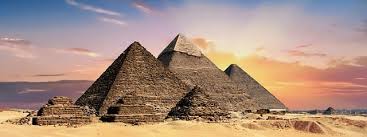 |
Uncover the rich and layered history of Egypt—from prehistoric settlements and ancient dynasties to Islamic rule, colonial influence, and today’s modern republic. |
Egypt, a land of timeless wonder, boasts one of the world's most enduring civilizations. From the ancient pyramids to modern-day governance, Egypt's history is a tapestry woven with tales of innovation, conquest, and resilience. This article delves into the rich history of Egypt, tracing its evolution from prehistoric times to the present day.
Geographical Overview
Ancient Egypt (circa 3100 BC - 30 BC)
Origins and Unification
Human settlements along the Nile date back to the 6th millennium BCE. Around 3100 BC, King Narmer (also known as Menes) unified Upper and Lower Egypt, establishing the First Dynasty and marking the beginning of the Pharaonic era.
Pharaonic Period
The Pharaonic period is divided into several key eras:
-
Old Kingdom (c. 2686–2181 BC): Known as the "Age of the Pyramids," this era saw the construction of monumental structures like the Great Pyramid of Giza.
-
Middle Kingdom (c. 2040–1640 BC): A period of political stability and cultural renaissance, marked by advancements in art, literature, and architecture.
-
New Kingdom (c. 1550–1069 BC): Egypt's most prosperous era, characterized by territorial expansion and the reigns of powerful pharaohs like Hatshepsut and Ramses II.
Civilizational Achievements
Ancient Egypt was a cradle of civilization, pioneering in various fields:
-
Writing: The development of hieroglyphics facilitated record-keeping and literature.
-
Architecture: The construction of temples, tombs, and pyramids showcased advanced engineering skills.
-
Science: Notable progress in mathematics, astronomy, and medicine.
-
Religion: A complex pantheon of gods and goddesses influenced daily life and governance.
Trade and Influence
Later Periods
Greek and Roman Rule
In 332 BC, Alexander the Great conquered Egypt, founding the city of Alexandria. After his death, the Ptolemaic Dynasty ruled until 30 BC, when Egypt became a province of the Roman Empire following the defeat of Queen Cleopatra VII.
☪️ Islamic Conquest
The 7th century CE marked the Islamic conquest of Egypt, introducing Islam and Arabic culture. Cairo emerged as a center of Islamic learning and culture during this period.
Ottoman Empire
In 1517, Egypt became part of the Ottoman Empire, maintaining a degree of autonomy under local rulers. This period lasted until the French invasion in 1798.
British Influence
Independence and Modern Egypt
Egypt declared independence in 1952 following a revolution led by the Free Officers Movement. In 1953, it became a republic, with various political transitions occurring since then. Currently, Egypt is led by President Abdel Fattah el-Sisi.
Timeline of Key Historical Events
| Year | Event |
|---|---|
| c. 7000 BCE | Settlement of Nile Valley begins |
| c. 3100 BC | Unification of Upper and Lower Egypt by King Narmer |
| c. 2686–2181 BC | Old Kingdom period; construction of pyramids |
| c. 2040–1640 BC | Middle Kingdom period |
| c. 1550–1069 BC | New Kingdom period; expansion and prosperity |
| 332 BC | Conquest by Alexander the Great |
| 30 BC | Egypt becomes a Roman province |
| 7th century CE | Islamic conquest of Egypt |
| 1517 | Incorporation into the Ottoman Empire |
| 1882 | British occupation begins |
| 1952 | Egyptian Revolution; declaration of independence |
| 1953 | Establishment of the Republic of Egypt |
Cultural and Historical Heritage
Egypt's rich cultural heritage includes:
-
UNESCO World Heritage Sites: Such as the Pyramids of Giza, the Valley of the Kings, and historic Cairo.
-
Museums: The Egyptian Museum in Cairo houses an extensive collection of ancient artifacts.
-
Festivals: Traditional festivals like Ramadan and Eid are celebrated nationwide.
-
Language: While Arabic is the official language, ancient Egyptian scripts like hieroglyphics are studied for historical insights.
Top 10 Historical Facts about Egypt
-
The Great Pyramid of Giza is the only surviving wonder of the ancient world.
-
Ancient Egyptians believed in an afterlife, leading to elaborate burial practices.
-
Cleopatra VII was the last active ruler of the Ptolemaic Kingdom.
-
The Rosetta Stone was key to deciphering Egyptian hieroglyphs.
-
The Nile's annual flooding was crucial for agriculture.
-
Pharaohs were considered both kings and gods.
-
Egyptians made significant advances in medicine and surgery.
-
The Library of Alexandria turned into one in every of the most important and maximum extensive libraries of the historical world.
-
The Suez Canal, completed in 1869, connects the Mediterranean Sea to the Red Sea.
-
Egypt was a founding member of the United Nations and the Arab League.







